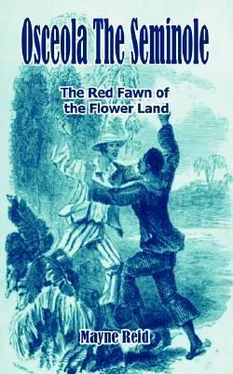"Grieve not, Osceola! thou art avenged! — the chitta mico has avenged you!"
Saying this, she glided rapidly away, and before the astonished listeners could intercept her retreat, she had entered among the bushes and disappeared.
The horror-struck wretch tottered over the ground, pale and terrified, his eyes almost starting from their sockets.
Men gathered around and endeavoured to administer remedies. Gunpowder and tobacco were tried, but no one knew the simples that would cure him.
It proved his death-stroke; and before another sun went down, he had ceased to live.
With Osceola’s capture the war did not cease — though I bore no further part in it. Neither did it end with his death, which followed a few weeks after — not by court-martial execution, for he was no rebel, and could claim the privilege of a prisoner of war, but of that disease which he knew had long doomed him. Captivity may have hastened the event. His proud spirit sank under confinement, and with it the noble frame that contained it.
Friends and enemies stood around him in his last hour, and listened to his dying words. Both alike wept. In that chamber there was not a tearless cheek — and many a soldier’s eye was moist as he listened to the muffled dram that made music over the grave of the noble Osceola .
After all, it proved to be the jovial captain who had won the heart of my capricious sister. It was long before I discovered their secret — which let light in upon a maze of mysteries — and I was so spited about their having concealed it from me, that I almost refused to share the plantation with them.
When I did so at length, under threat of Virginia — not her solicitor — I kept what I considered the better half for myself and Maümee. The old homestead remained ours, and a new house soon appeared upon it — a fitting casket for the jewel it was destined to contain.
I had still an out-plantation to spare — the fine old Spanish clearing on the Tupelo Greek. I wanted a man to manage it — or rather a "man and wife of good character without incumbrances."
And for the purpose, who could have been better than black Jake and Viola, since they completely answered the above conditions?
I had another freehold at my disposal — a very small one. It was situated by the edge of the swamp, and consisted of a log cabin, with the most circumscribed of all "clearings" around it. But this was already in possession of a tenant whom, although he paid no rent, I would not have ejected for the world. He was an old alligator-hunter of the name of Hickman.
Another of like "kidney" — Weatherford by name — lived near on an adjoining plantation; but the two were oftener together than apart. Both had suffered a good deal of rough handling in their time, from the claws of "bars," the jaws and tails of alligators, and the tomahawk of Indians. When together or among friends, they were delighted to narrate their hair-breadth escapes, and both were often heard to declare that the "toughest scrape they ever come clar out o’, wor when they wor on a jury-trial, surrounded by a burnin’ forest o’ dog-goned broom pines, an’ about ten thousand red Indyuns."
They did come clear out of it, however, and lived long after to tell the tale with many a fanciful exaggeration.
The End.
End of the Project Gutenberg EBook of Osceola the Seminole, by Mayne Reid
*** END OF THIS PROJECT GUTENBERG EBOOK OSCEOLA THE SEMINOLE ***
The Project Gutenberg EBook of Osceola the Seminole, by Mayne Reid
This eBook is for the use of anyone anywhere at no cost and with
almost no restrictions whatsoever. You may copy it, give it away or
re-use it under the terms of the Project Gutenberg License included
with this eBook or online at www.gutenberg.org
Title: Osceola the Seminole
The Red Fawn of the Flower Land
Author: Mayne Reid
Illustrator: N. Orr, (Engraver)
Language: English
*** START OF THIS PROJECT GUTENBERG EBOOK OSCEOLA THE SEMINOLE ***
Produced by Nick Hodson of London, England












